At the Aspen Institute Economic Opportunities Program, and for our many colleagues and partners, the ongoing and intertwined health, economic, and racial justice crises bring new urgency to our work to improve access to quality jobs, options to participate in business ownership, and the freedom to pursue economic opportunity. Below we share our monthly newsletter with highlights of recent work. As always, we welcome your feedback, thoughts, and partnership in advancing inclusive opportunity and an economy in which we all can thrive. Click here to subscribe.
Click here to view past editions of our newsletter.
Upcoming Events
EOP will continue to host virtual events and webinars this season. Join our mailing list and follow us on social media to learn when new opportunities are available.
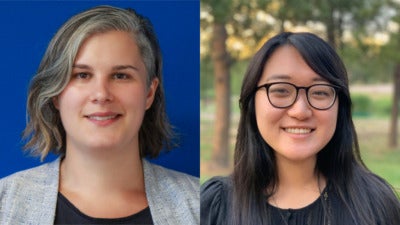
September 30: Good Jobs Good Business Tools: How Employee-Focused Employers Can Drive Better Business Results
On September 30, the Colorado Department of Labor and Employment will host a webinar entitled, “Good Jobs = Good Business: How Job Quality Drives Better Business Results,” featuring Workforce Strategies Initiative Associate Director Jenny Weissbourd, Senior Research Associate Mohona Siddique, Research Associate Yoorie Chang, and our partners Tom Woelfel and Sanjana Seth from Pacific Community Ventures. Speakers will discuss tools and techniques aimed at small businesses for improving job quality and driving business performance, including resources from EOP’s Job Quality Tools Library and PCV’s Good Jobs Good Business Toolkit. The discussion is scheduled for 9 a.m. MDT (11 a.m. EDT). Click here to register.
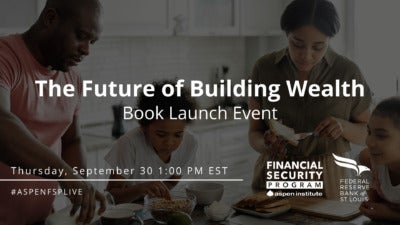
September 30: The Future of Building Wealth: Brief Essays on the Best Ideas to Build Wealth—for Everyone
Business Ownership Initiative Director Joyce Klein contributed a chapter on small business and wealth building to the new book, The Future of Building Wealth: Brief Essays on the Best Ideas to Build Wealth—for Everyone, produced by the Federal Reserve Bank of St. Louis and the Aspen Institute Financial Security Program. The book provides policymakers and financial leaders with the tools, resources, and innovative ideas to pave the way for economic growth and prosperity for all American families. Join us for the virtual book launch on September 30 at 1 p.m. EDT. Click here to register.
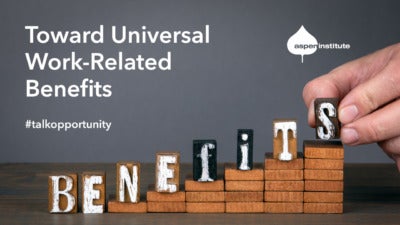
October 13: Toward Universal Work-Related Benefits
The COVID-19 pandemic highlighted the important role benefits play in workers’ lives. Paid leave, health insurance, workers’ compensation, and retirement plans cushion life events and equip workers to live safe and dignified lives. Our current system of benefits, though, leaves behind millions of workers. This event by the Future of Work Initiative will explore how to make work-related benefits accessible to more people, including public and private sector approaches to portable and universal benefits. Speakers include Lise Anderson (Writers Guild of America West), Anmol Chaddha (Omidyar Network), Palak Shah (National Domestic Workers Alliance), and more to be announced. Click here to register.
October 14: Global Inclusive Growth Summit
Join us on October 14 for the Global Inclusive Growth Summit, presented in partnership with the Mastercard Center for Inclusive Growth. The Summit will bring together leaders from across sectors to catalyze new partnerships and shine a spotlight on solutions that advance inclusive and sustainable economies around the world. Join a community of purpose-driven leaders for a day-long summit to take collective action towards rebuilding an economy that works for everyone, everywhere. Business Ownership Initiative Director Joyce Klein will facilitate a breakout session on Realizing the Potential of Digitization for Small Businesses. Click here to register.
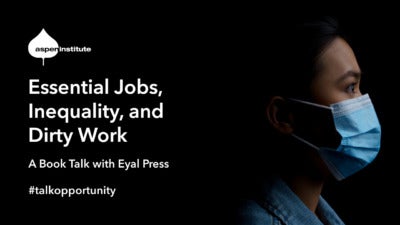
October 20: Essential Jobs, Inequality, and “Dirty Work”: A Book Talk with Eyal Press
The pandemic has heightened many organizations’ focus on job quality: now is the time to shift focus from fixing workers to fixing work. Companies are under more pressure to improve factors that contribute to job quality including wages, benefits, workplace safety, racial and gender equity, and opportunities to learn and grow. But often overlooked is the content of the work—how does what we do align with who we think we are? In his new book, “Dirty Work: Essential Jobs and the Hidden Toll of Inequality in America,” Eyal Press explores the toll of moral injuries at work, highlighting the working conditions of jobs that typically go unseen and raising disquieting questions about our society and its dependence on these jobs. For anyone concerned about job quality, “Dirty Work” is essential reading. Please join us on October 20 for a conversation with the author. Click here to register.
News and Updates
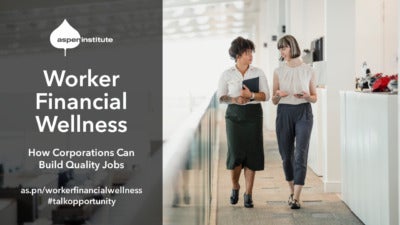
Worker Financial Wellness: How Corporations Can Build Quality Jobs
On Wednesday September 15, our Opportunity in America discussion series continued with Worker Financial Wellness: How Corporations Can Build Quality Jobs. As the US economy emerges from COVID-19, business leaders are considering solutions to shape an equitable and inclusive recovery and take action for racial equity. One path: making worker financial wellness a corporate priority. Research shows that improving workers’ financial wellness benefits not only workers themselves, but also business outcomes such as productivity, innovation, customer satisfaction, and employee turnover and engagement. This event focused on what companies can accomplish when they pursue improving the financial health and resilience of workers. To watch the recording of the event, click here.
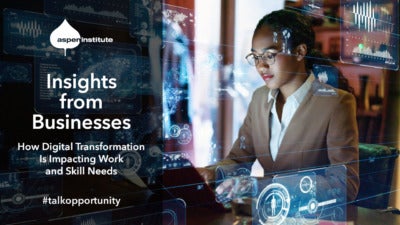
Insights from Businesses: How Digital Transformation Is Impacting Work and Skill Needs
We’ve been speaking with employers to learn how businesses are adopting technology in the workplace, how digital transformation is impacting skill needs for frontline workers, and what approaches businesses are taking to support development of digital skills for frontline workers. On September 22, we held a virtual event looking at what we have learned from employers and what can and should be done to help workers build the skills they need to advance in the workplace. This is the third part of a year-long study looking at how COVID-19 and heightened attention to racial inequality are affecting businesses’ operations, skill needs, hiring and HR practices, and education and training programs. Click here to watch the recording and read more about the event.
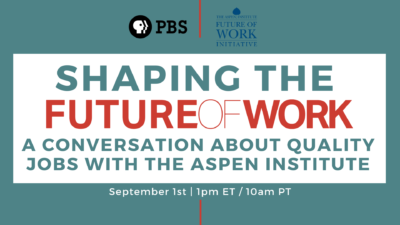
Shaping the Future of Work: A Conversation About Quality Jobs
On September 1, we hosted a virtual event, Shaping the Future of Work: A Conversation About Quality Jobs. Presented in partnership with PBS, this conversation explored how we can ensure that the jobs we add back to our recovering economy are high-quality jobs providing a ladder to success for more workers. Speakers include Nafisah Ula, organizing director of Jobs with Justice; Rachel Korberg, executive director and co-founder of the Families and Workers Fund; Rick Plympton, CEO of Optimax and Job Quality Fellow of the Aspen Institute; Alex Camardelle, director of the Workforce Policy Program at the Joint Center for Political & Economic Studies; and Shelly Steward, director of the Future of Work Initiative. Click here to watch.
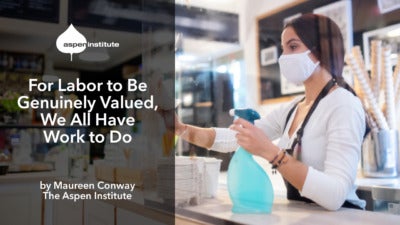
For Labor to Be Genuinely Valued, We All Have Work to Do
“This Labor Day amid continued crisis, honor and recognition of workers couldn’t be more warranted,” EOP Executive Director Maureen Conway writes for the annual holiday. In this piece, she discusses the necessity of recognizing the crisis in job quality that we are experiencing, and asks, “In a country that views hard work as foundational to the American Dream, how did we end up overrun with bad jobs?” Conway makes it clear that it’s time for employers to ensure that workers are treated with respect and dignity through building better business models. “People have choices,” she writes. “This Labor Day let’s choose to improve job quality, and put that American Dream back within reach of America’s working people.” Read her full piece here.

Centering Worker Voice in Employer Engagement and Program Design
In recent years, many workforce organization leaders have expressed interest in learning how to conduct their own worker-focused research and have asked for tools to help them build worker input into design and delivery of programs and business services. In response, Workforce Strategies Initiative Associate Director Jenny Weissbourd, former Research Associate Vivian Vázquez, former Senior Evaluation Manager Ranita Jain, Research Associate Yoorie Chang, and EOP Research Director Amy Blair developed two tools: a guide to conducting worker focus groups and a tool for conducting worker surveys. These tools are beta versions, and we look forward to getting user feedback as we continue testing them with workforce development leaders and employers.
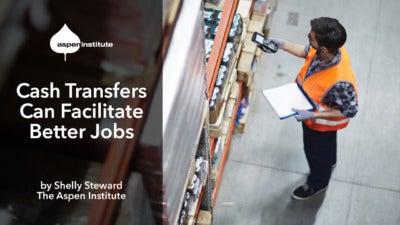
Cash Transfers Can Facilitate Better Jobs
In a new blog post, Future of Work Initiative Director Shelly Steward writes about the foundational security that cash assistance can provide. She discusses how this security allows workers to act with dignity in their job choice, and allows them the freedom to empower themselves to demand more from their jobs. She also discusses the mythos surrounding the idea that cash assistance disincentivizes work or fosters dependence, arguing that studies of these types of programs have actually shown the opposite to be true. “The more universal a program is, the more likely it is to create a common floor,” she notes. The future of work necessitates this kind of common floor in order to build a healthier labor market. Read the full piece here.
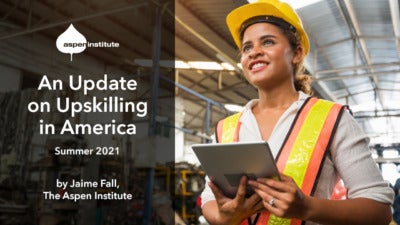
An Update on Upskilling in America: Summer 2021
In a new blog post, Upskill America Director Jaime Fall reflects on the exciting advancements that the upskilling movement has seen throughout the past few months. He discusses news from the retail sector, including Amazon, which announced an expansion of their Career Choice program for frontline workers; Target, which teamed up with Guild Education to offer employer-funded college degree and certification programs for its 340,000 employees; and Walmart, which made its Live Better U program free for its 1.5 million part-time and full-time Walmart and Sam’s Club employees. Read the full update here.
In addition, Fall joined Dr. Kate Hixon’s Dauntless podcast to talk about improving quality of work and quality of life for workers. He spoke about the ways in which people can learn and grow in their careers, the importance of advancing in one’s job, and the necessity of being able to leave a job if advancement is not an option. Listen to the discussion here.

Greater Phoenix Workforce Leadership Academy Fellows begin projects to enact systemic change
In mid-September, the Greater Phoenix Workforce Leadership Academy Fellows began working on their collaborative projects (CoLabs) to enact systemic change within the Greater Phoenix workforce ecosystem. Topics they will explore are:
As a system, how might we….
- …make it easier for stakeholders to navigate the workforce system?
- …engage employers in improving job quality?
- …support employers with addressing equity and inclusion in the workplace?
- ….ensure collaboration in planning and delivery of workforce services?
To supplement their CoLab projects, Fellows also discussed collaborative partnerships this month. Phoenix’s very own Orlando Cazarez (Senior Program Manager for our site partner, Center for the Future of Arizona), Terence “Dee” Pinkston (Fellow and Deputy Director of Workforce Solutions, Chicanos Por La Causa, Inc.), and Roz Boxer (Retired, Arizona Commerce Authority) shared their collaboration stories while working on the Maryvale Workforce Development Initiative. After this local case study, Amanda Bergson-Shilcock (National Skills Coalition) kept action at the forefront of Fellows’ minds as she shared policy advocacy strategies for leveraging systemic change among other workforce practitioners and stakeholders. Fellows will reconvene on Thursday, September 30th to debrief about learnings from the 360-degree leadership assessments they completed this summer. Please stay tuned for next month’s updates on CoLab projects and our session on evidence-based practices.

Inclusive Small Business Recovery in Miami
On September 29, Business Ownership Initiative Director Joyce Klein spoke at Finance Local, a forum focused on ensuring a just recovery and future for Miami-Dade’s diverse small businesses. Presented by Axis Helps, Citi, and Miami-Dade Commissioner Eileen Higgins, the forum is bringing together national and local business leaders to explore new small business financing solutions that can help the city’s wide range of local enterprises thrive.
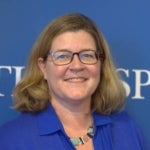
Promoting Equity and Inclusion for Young Workers
On September 29, EOP Research Director Amy Blair partnered with Sam DeCarlo, director of workforce development at Our Piece of the Pie, at a virtual learning event convened by the Aspen Institute Forum for Community Solutions/Opportunity Youth Forum. They explored practices that youth and young adult-serving workforce organizations use to influence employer practice change to promote equity and inclusion. Practical examples of the work of OPP and other organizations are highlighted in EOP’s recent Generation Work report Promoting Equity and Inclusion and Connection to Good Fit Jobs for Young Adults. Click here for more information about the Opportunity Youth Forum conference.

The Best of Both Worlds? Making Hybrid Work
On September 23, Future of Work Initiative Director Shelly Steward joined The Economist for a panel discussion on how businesses are navigating a hybrid model of work, and how we can ensure this model is both successful and sustainable. Steward spoke alongside fellow panelists Prasad Setty (Google), Prithwiraj Choudhury (Harvard Business School), Brooke Weddle (McKinsey & Company), and moderator Kenneth Cukier (The Economist). Watch the recording of the conversation here (registration required).
Steward also took part in the September 28 meeting of the Illinois Future of Work Task Force, speaking alongside Brian Fabes (Corporation Coalition of Chicago) in a discussion on “The Present and Future State of Work in Illinois.” Learn more.
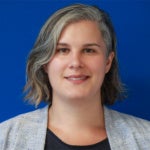
Race and Gender Wealth Equity and the Role of Employee Share Ownership
Workforce Strategies Initiative Associate Director Jenny Weissbourd was a featured speaker at the Global Equity Organization’s 22nd Annual Conference, where she discussed race and gender wealth equity and the role of employee share ownership. Weissbourd spoke alongside Joseph Blasi—Distinguished Professor at the Rutgers School of Management and Labor Relations and director of the Institute for the Study of Employee Ownership and Profit Sharing—and Robyn Shutak, Equity Advisory Services Practice Leader at Computershare. Click here to learn more about the conference. Weissbourd and Blasi were coauthors to a related publication, Race and Gender Wealth Equity and the Role of Employee Share Ownership.
Join the conversation
Follow EOP on social media to join the conversation!
-Workforce Strategies Initiative @AspenWorkforce
-Business Ownership Initiative @Aspen_BOI
-UpSkill America @upskillamerica
-Future of Work Initiative @AspenFutureWork
About EOP
The Aspen Institute Economic Opportunities Program (EOP) advances strategies, policies, and ideas to help low- and moderate-income people thrive in a changing economy. We recognize that race, gender, and place intersect with and intensify the challenge of economic inequality and we address these dynamics by advancing an inclusive vision of economic justice. For over 25 years, EOP has focused on expanding individuals’ opportunities to connect to quality work, start businesses, and build economic stability that provides the freedom to pursue opportunity. For more information, visit as.pn/eop.
EOP has several initiatives, including the Business Ownership Initiative, Workforce Strategies Initiative, UpSkill America, Good Companies/Good Jobs, and the Future of Work Initiative. In addition, across these approaches EOP hosts the Economic Opportunity Fellows Network and the Opportunity in America event series.
Thank you to our many partners and funders for supporting our efforts.
Support Our Work
We are committed to making our events and publications freely available to everyone who finds them useful. But if you find value in our work and are able to support it, please consider making a tax-deductible donation. Click here to learn more.
Keep in Touch
Click here to join our mailing list. For updates every day, follow us on social media.

